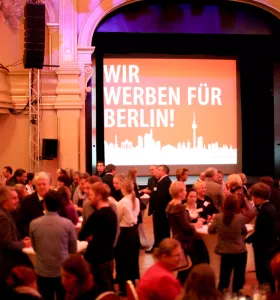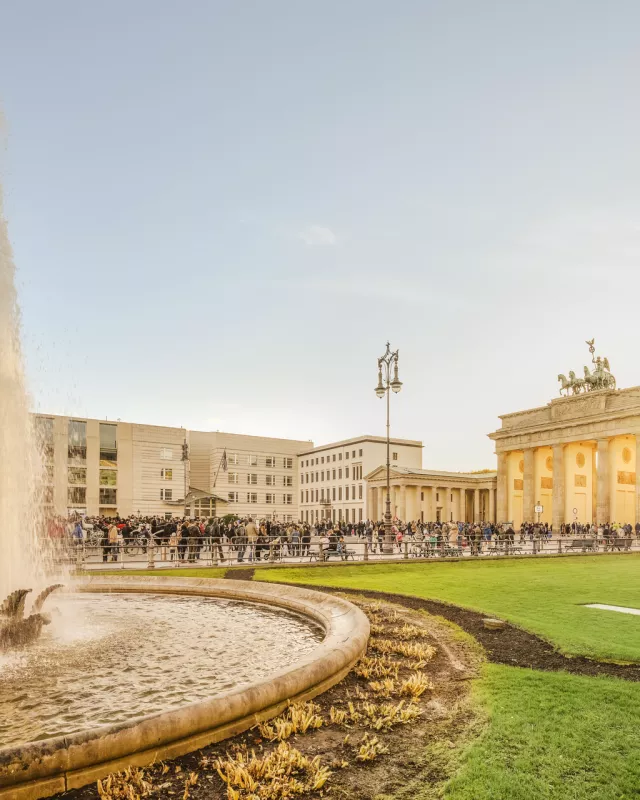Berlin Welcomes Record Numbers of Tourists and Convention Participants in 2014: 28.7 million overnight stays 25 years after the Fall of the Wall
Berlin, 18 February 2015 The tourism figures for Berlin have once again broken records with 28.7 million overnight stays (+6.5% over 2013) and 11.9 million guests (+4.8%). In the year when Berlin marked a quarter century since the Fall of the Berlin Wall, the German capital was able to break the 28-million mark in the number of overnight stays in the city.
Berlin's governing mayor, Michael Müller, comments: "2014 was the best year yet for tourism and conventions in Berlin. The capital is one of the fastest growing destinations in the world. Berlin has established itself as one of the top three most popular cities to visit in Europe. And the city's also playing in the major leagues of the convention industry. Tourism and meetings are of paramount importance for Berlin's economy and the jobs they create here in the city. visitBerlin and the Senate will continue to work harder to keep up these excellent results."
"International visitors made up 43.6 per cent of the overnight stays in Berlin last year—a new record," says Burkhard Kieker, CEO of visitBerlin. "The anniversary of the Wall's fall was a major opportunity for Berlin and its tourism industry: The border of light truly inspired those who came and resulted in our strongest tourism figures yet. We expect that the anniversary will continue to have a long-term impact and that visitor levels will remain high. In addition, our activities in far-away markets are paying off."
Berlin attracts guests from all over the world
Berlin saw visitors from outside Germany spend 12.5 million nights in the city last year, representing a jump of 8.1 per cent (compared to a 5% jump in international guests for all of Germany). The number of international visitors increased by 5.2 per cent to 4.5 million. 71.8 per cent of all overnight guests from outside Germany came from within Europe, while the remaining 28.2 per cent came from further afield. Visitors from Germany accounted for 56.4 per cent of all overnight stays in the capital.
It is noteworthy that the city posted a strong growth of around ten percent each from some key European countries: The most overnight stays from within Europe were from visitors from the United Kingdom (1.3 million, +7.8%). Also Italy (+10.4%), the Netherlands (+8.1%), Spain (+8.9%) and Poland (+18.2%) posted a strong growth in visitors to the German capital. The United States, the strongest non-European market, sent guests who stayed about 1 million nights, a jump of about 10.5 per cent over the previous year.
Berlin also posted high rates of growth from other regions, especially from Asia, such as the Gulf States (+24.6%), Israel (+24.4%), Korea (+24.2%), India (+18.0%), and also from Brazil (+10.5%). At 3.9 days on average, guests from Arab countries spent the highest number of days in the city.
"The results from 2014 underscore the major growth in the international appeal of the city, with 43.6 per cent of all nights booked being booked from abroad. In 1992, the first year unified tourism statistics were collected for the whole of Berlin, this share was a mere 26.8 per cent. Since then, the number of overnight stays by foreign guests has jumped more than six-fold," says Astrid Langer of the Amt für Statistik Berlin-Brandenburg.
If one takes Berlin's numbers for overnight stays by international visitors (12.5 million in 2014) and compares them to the same figure for all of Germany (75.5 million), one out of every six nights spent in Germany by a foreign visitor was spent in the capital.
Convention business continues to grow: More than 7 million overnight stays for the first time
Berlin's convention and meetings industry also posted its most successful year yet in 2014. According to the latest congress statistics* of the visitBerlin Berlin Convention Office, last year saw some 11 million participants (+3% over the previous year) coming to more than 131,000 events (+4%) held in the German capital. Approximately a quarter of all hotel stays in Berlin stem from the convention business. For the first time ever, the city's conferences generated more than seven million hotel stays (+4.5%). The meetings industry has grown to become a reliable factor for the success of Berlin's hotels and overall economy.
"An average of 360 events bringing in 30,000 participants each day speaks for itself: Berlin is one of the world's most important meeting and convention locations," says Burkhard Kieker, CEO of visitBerlin.
Berlin's governing mayor, Michael Müller, comments: "It is particularly pleasing to note the growth in events in Berlin with fewer than 2,000 participants. One of the challenges will be more major events with over 3,000 participants. The world wants to hold their meetings here so much that we can hardly keep up with the capacities. Berlin is in a luxurious position in this situation."
Berlin as a centre for science and research
The German capital is especially in demand for events related to the sciences: Measured by the number of participants, meetings and conferences related to science and research represented 15 per cent of the total in 2014 (up from 14% in 2013), followed by politics and public bodies (12%). 2.1 million participants came from abroad, meaning one in five participants at events in the city came from outside Germany.
Major economic engine for Berlin: Berlin's meeting and convention industry generated €2.2 billion in 2014 (up 9% over 2013) and is responsible for approximately 38,000 full-time jobs in the German capital. Conference attendees spend an average of €232 a day when visiting the city.
Visitors to the city had 134,399 beds in 788 establishments to choose as of this past December. With an average of 58.3 per cent, occupancy rates were the best posted in the past 25 years.



